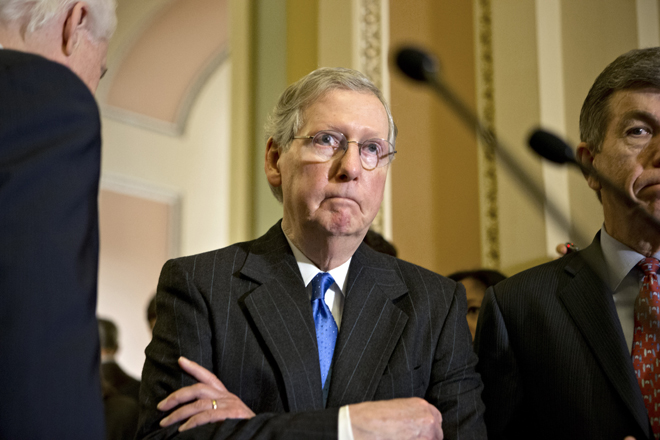For a few weeks now — ever since Majority Leader Harry Reid (D-NV) began stepping up pressure on Republicans to confirm key executive branch and judicial nominees — Minority Leader Mitch McConnell (R-KY) has come as close as it comes in the Senate to calling another member a liar.
“The majority leader has twice committed on the Senate floor not to use the nuclear option,” McConnell said on the floor two weeks ago. “These were not conditional commitments. … The majority leader needs to keep his commitments.”
And then again this Tuesday, at his weekly briefing with reporters: “Commitments were made. And on behalf on Senate Republicans, I intend to ask the majority leader every single day, ‘Is your word good, do you intend to keep your word?'”
Effectively, McConnell is trying to shame Reid into dropping a threat to invoke the “nuclear option” if Republicans block key administration nominees. But Reid handed him that ammunition over two years ago.
McConnell’s referring to two different comments Reid made on the floor, two years apart. Both came after the two men agreed on trivial changes to Senate rules and customs, at the beginning of this Congress and the previous one. Most recently, Reid said any further rules changes in the current Congress would occur under regular order, which typically requires two-thirds support in the Senate. That time, his staff quickly clarified that Reid’s pledge was contingent upon Republicans adhering to the spirit of the rules reforms.
But in January 2011, Reid’s remarks had a “Read. My. Lips.” quality to them.
“The minority leader and I have discussed this issue on numerous occasions,” Reid said on the Senate floor, according to the congressional record. “I know that there is a strong interest in rules changes among many in my caucus. In fact, I would support many of these changes through regular order. But I agree that the proper way to change Senate rules is through the procedures established in those rules, and I will oppose any effort in this Congress or the next to change the Senate’s rules other than through the regular order.”
Reid spokesman Adam Jentleson says the remarks were implicitly conditioned on an understanding that Republicans wouldn’t block nominees except under extraordinary circumstances.
“You can’t credit McConnell’s argument on its face,” he said. “This agreement and the one from January were both two-way streets — Republicans have a responsibility to honor their commitments, and they haven’t.”
Months after the Democratic push for filibuster reform failed in January 2011, Reid noted on several occasions that the agreement he had reached with McConnell had fallen apart, and that he’d erred by not changing the rules at the beginning of the 112th Congress. And since that time he’s been pretty clear that he’d only resort to changing the rules by majority vote under extraordinary circumstances — such as if Republicans were to serially block key nominees.
But that’s not the impression Reid left when he initially made the comments two and a half years ago.






